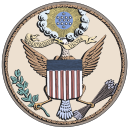
Back Pennsylvanie durant la guerre de Sécession French Pennsylvania nella guerra di secessione americana Italian
 |
|
Union states in the American Civil War |
|---|
|
|
| Dual governments |
| Territories and D.C. |
During the American Civil War, the Commonwealth of Pennsylvania played a critical role in the Union, providing a substantial supply of military personnel, equipment, and leadership to the Federal government. The state raised over 360,000 soldiers for the Federal armies. It served as a significant source of artillery guns, small arms, ammunition, armor for the new revolutionary style of ironclad types of gunboats for the rapidly expanding United States Navy, and food supplies. The Phoenixville Iron Company by itself produced well over 1,000 cannons, and the Frankford Arsenal was a major supply depot.
Pennsylvania was the site of the bloodiest battle of the war, the Battle of Gettysburg, which became widely known as one of the turning points of the Civil War.[1] Numerous more minor engagements and skirmishes were also fought in Pennsylvania during the 1863 Gettysburg Campaign, as well as the following year during a Confederate cavalry raid that culminated in the burning of much of Chambersburg, Pennsylvania.
Several significant Federal leaders hailed from the Commonwealth. Military leaders from Pennsylvania included Generals George G. Meade (the victorious commander at Gettysburg and from Philadelphia), Winfield S. Hancock, John F. Reynolds, Admiral David D. Porter, and Quartermaster General Montgomery C. Meigs. Pennsylvanians also rose to prominence as political figures during the war, like Secretary of War Simon Cameron and the fiery Radical Republican abolitionist Representative Thaddeus Stevens. A small number of Pennsylvanians joined the ranks of the Confederacy, including such leaders Generals John C. Pemberton and Josiah Gorgas.
- ^ McPherson, James M., Battle Cry of Freedom: The Civil War Era. New York: Oxford University Press, 1988. p. 665